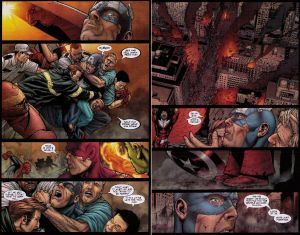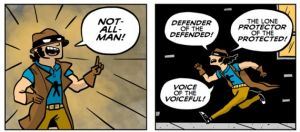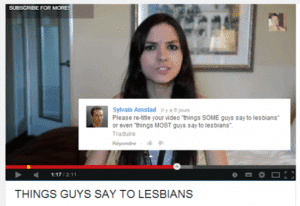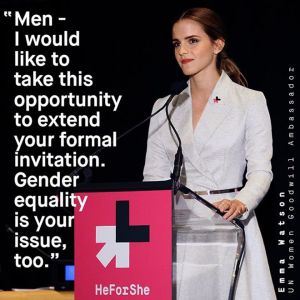Comics/Culture #5: Superheroes vs. #HeForShe
By Zak Edwards
October 3, 2014 - 13:15
While I always welcome discussion, I hope this article in particular can be a place for us all to share our thoughts, either in the comments below or by hitting me up on the social medias. In other words, Tweet at me.
Emma Watson took the stage at the UN last week to discuss gender equality and, in the speech, she offered a formal invite to men around the world to join in on the gender equality game.
I, for one, am declining the invite, and it’s because superheroes taught me something very important about gender politics.
Two comics come to my mind when I think about men and feminism: Marvels and Civil War. Neither address feminism head-on in real way, but they still demonstrate the conundrum that men are placed in when it comes to the feminist conversation. Marvels follows not-superhero everyman Ben Urich who witnesses pretty much the entire history of the Marvel universe, makes superheroes take a backseat for once. Instead of the usual melodrama about powers and responsibility, we get a very human perspective on what living in a world of superheroes would look like. When Urich sees Giant Man, for example, the hero towers above with Urich wide-eyed in fear and disbelief. When a mutant girl ends up in Urich’s basement to hide from bigots, Urich’s family dramatizes what prejudice can do to a person, a family, an entire world.
 |
Civil War, on the other hand, is a comic that concerns the public without really giving them much time to speak. We have one character, a mom of a deceased child, but mostly the heroes sit around and discuss public safety vs. freedom, in their full costumes no less. Writer Mark Millar seems to favour the freedom side for most of the series, but a sudden intrusion of the common man blurs the clearly set lines between freedom and security, the non-powered public and the super-powered elite. At the story’s climax, just as Captain America’s about to punch Iron Man really hard in the face, he’s tackled to the ground by a group of civilians. Cap shouts a the men “I don’t want to hurt you!” The men respond with “You’re kidding right.” The page pans out to the devastation that Cap and his merry band of anti-Registration freedom fighters have caused. He orders everyone to stop. “We’re not fighting for the people anymore,” he says, “We’re just fighting.”
 |
What these two comics do is forcefully inject a narrative of every single other person on the planet into a genre that puts exaggerated violence at the forefront, that focuses on the battles and struggles of the world’s most powerful people. It gives some necessary perspective. When Ben Urich is looking at Giant Man, he’s terrified and bewildered. He knows there’s a gap between them, in terms of power, visibility, and access. Giant Man can and is a superstar. Ben Urich remains unnoticed on the ground. His only power is the dwindling power of print, something constantly reeled and manipulated by men above his station who simply don’t care.
In the case of Civil War, Captain America is genuinely surprised at the destruction he’s caused. He even threatens those he claims to be supporting and representing. But he isn’t protecting them. In a way, absolutely no one is, but every superhero in the Marvel universe has already picked a side on the issue while the people it affects get barely a word in until the very end.
The metaphor isn’t that hard to see: men are the superheroes, women aren’t, and it skews the male perspective because they command the camera better, they are allowed to do what they want with less repercussions, they do things that hurt people, often without even knowing it and despite their best intentions because they can’t see what the common person sees.
In this sense, when Pharrell went on record as saying “I don't think it's possible for me to be that” when asked if he was a feminist. I wonder sometimes if that’s true.
I’m sorry to say it, but men, white men in particular in this part of the world, are born with a certain superpower. It’s called privilege and, most of the time, men don’t even see that they have it. But they know in their heart of hearts they have it because they fight dirty when the tiniest amount of it is threatened in any way. Tactics include rape threats to a woman who wants to discuss sexism in video games or threats of releasing nude photos of a woman who simply stood up at the UN and said men need to care about feminism.
Now these are sometimes seen as unfair examples, even though we can look at these instances and wonder aloud why no one was charged with crimes despite women reporting disturbingly high numbers of abuse online and daily in the street. So let’s look at a less unfair example from my own life:
I am a feminist, at this point in which I still think a man can be a feminist. I have incredible female friends who are smart, funny, and crazy that I simply adore. I have my entire life. I took some gender classes in university and did a seminar of gender violence and visual culture in my graduate work. I get outraged at things like those DC t-shirts and have discussions about feminism with male and female friends a lot. I don't say this to brag, and people giving me the "good on ya" for speaking up honestly makes me feel weird. If anything I'm still just that wide-eyed kid wanting to learn and stepping on people's toes without knowing it.
 |
So I, being someone with a propensity to self-righteousness, consider myself a feminist, and maybe even a good one in my most private conversations. But not one week before the #YesAllWomen and #NotAllMen hashtags started, I used the "not all men" argument on J. Skyler, a gifted writer and trans activist who used to write here at The Bin, in a tweet I cannot find. In less than 140 characters, I proved again that I'm not a good feminist and I have a lot to learn. J. Skylar graciously didn't respond, so my shame up until now has been private.
And why did I use that argument? To shift the focus of the conversation onto men that are doing good work. Just like Giant Man walking across a conversation and saying, after accidentally stepping on a cat, that not all superheroes are bad. And saying it as if that means something. It doesn’t. It's a shutdown argument, one that's designed to shift the focus in the wrong direction and make it all about me. It's a violent taking back of someone's legitimate observation and thoughts, all because I wanted to be recognized as a "good guy." I was doing this:
 |
(Watch that video here)
Men are perhaps unable to be feminists because the entire idea of being a feminist means two things: giving up some privilege and recognizing previously invisible gender dynamics that you perpetuate without even knowing it. Male feminists, I dare to say it, are a violent force in the conversation, or at least the most well-intentioned bull in a china shop. We are inherently stupid at it, so stupid that we lack the ability to recognize our own stupidity unless someone points it out for us. And we have a tendency to act out when we feel our privilege is threatened. This altogether makes us terrible feminists, but ones who should never give up trying, even if the goal is impossible, because we can do good and need to be involved. I think.
If we view men as super-powered individuals, to keep this metaphor going just a little longer, then what does Emma Watson’s speech at the UN have to do with anything? Shouldn’t us men be accepting her #HeForShe invitation as a way to enter the conversation, to show that we care and can do something about it, if only women have a bit more patience with us when we screw up?
The first half of Watson’s speech is good, it really is in my opinion, but then it turns about halfway through and starts focusing on men and sounding a lot like those invisible ways that men stomp around feminism. We get a familiar argument that feminism can be good for everyone, and that's the exact opposite conversation we need to have. Watson's speech makes feminism all about men and what's in it for them.
 |
So when Watson says “I want men to take up this mantle. So their daughters, sisters, and mothers can be free from prejudice,” she’s placing women in a context men can understand, namely their relation to men. By saying women should be free from prejudice because they’re someone’s relation, she makes women the object of male reasoning rather than the subject: He should value a woman because she is his relation, not because of her intrinsic worth as a human being. And when Watson shows that gender inequality harms men as well, she’s trying to demonstrate, again, that feminism’s worth is in it’s relation to men. It’s like Watson is the guest speaker at a superhero rally where they all talk about how the policy benefits them and not the people who need their help. It’s self-absorbed and sad. And this isn't to say that gender inequality is not harmful to men, because it is, but being made fun of for liking Shirley Temples is a lot different from being threatened with rape because you don't like an overly-sexualized comic book cover of a teenager. If anything, men feeling threatened because they perform masculinity differently is an entirely different conversation.
What we should be saying is “Men, take up the feminist mantle because the system is broken, you know it’s broken, and it’s high time you fought for the equality of people you’ve actively and passively been keeping down for literally centuries.” The reasoning should be because the system is broken, because we know gender inequality is wrong, not to see what’s in it for us.
So I’m sorry, Emma Watson, I’m declining your invite because I’m already there. It’s hard on everybody, but I want to learn and help how I can, if you’ll still have me.
Not #HeForShe, where men get to be the subject again, but maybe #SheWithHelpFromMeIfSheWants.
I've received some great feedback on this piece and I'm so thankful for all of the input I've received. One bit in particular struck me, that I should include some "Further Reading" by some women who've been critical of the #HeForShe campaign. Here are just a few of the amazing articles out there:
"As a Feminist, Emma Watson's UN HeForShe Speech Makes Me Uncomfortable" by Lily Rae
"Why I'm Not Really Here for Emma Watson's Feminism Speech at the U.N." by Mia McKenzie
"Why Hating the #HeForShe Campaign Doesn't Make Me a Bad Feminist" by K.M. Deaver
"Emma Watson Speech Hardly a Game-Changer" by Clementine Ford
Related Articles:
Comics/Culture #5: Superheroes vs. #HeForShe
Comics/Culture #4: Watchmen's Squid
Comics/Culture #3: Stray Bullets and Billy Joel
Comics/Culture #2: The Economics of Spoiler Alerts
Comics/Culture #1: Marvel's Failed Diversity
